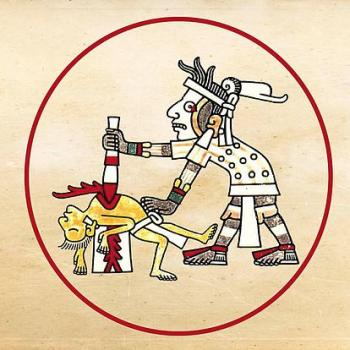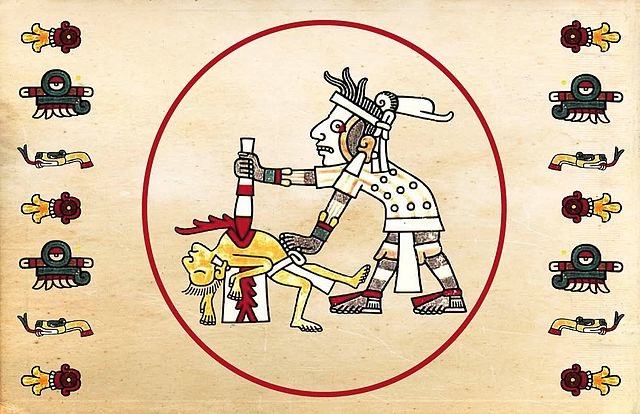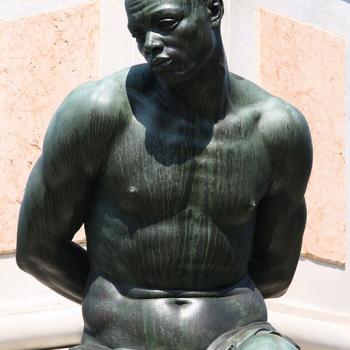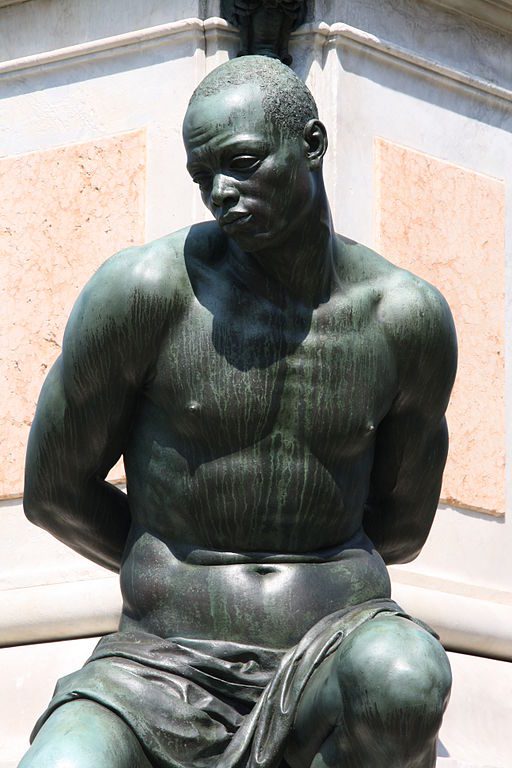
Atheist and anti-theist Bob Seidensticker runs the influential Cross Examined blog. He asked me there, on 8-11-18: “I’ve got 1000+ posts here attacking your worldview. You just going to let that stand? Or could you present a helpful new perspective that I’ve ignored on one or two of those posts?” He also made a general statement on 6-22-17: “In this blog, I’ve responded to many Christian arguments . . . Christians’ arguments are easy to refute.” He added in the combox: “If I’ve misunderstood the Christian position or Christian arguments, point that out. Show me where I’ve mischaracterized them.” I’m always one to oblige people’s wishes, so I decided to do a series of posts in reply.
It’s also been said, “be careful what you wish for.” If Bob responds to this post, and makes me aware of it, his reply will be added to the end along with my counter-reply. If you don’t see that at the end, rest assured that he either hasn’t replied, or didn’t inform me that he did. Bob’s words will be in blue. To find these posts, word-search “Seidensticker” on my atheist page or in my sidebar search (near the top).
*****
I’ve been going through Bob’s voluminous collection of anti-Christian posts for the purpose of this series, and there is nothing that he mentions more than slavery: as a supposed obvious disproof of the goodness of biblical teaching (and its inspiration) and of God Himself. Here is just a small (but altogether typical) sampling:
[W]e looked at the popular Christian notion that biblical slavery was a benign form of servitude, quite unlike American slavery. In fact, it turns out that they were almost identical. (5-4-18)
The Bible gives full support for the kind of slavery we had in the United States, but Christians had at least been hypocritical enough to pretend it didn’t. But not always. (3-16-16)
How can Christians satisfy themselves that the Ten Commandments have “Don’t covet” but not “Don’t enslave anyone”? The Bible is obviously the work of Man, not that of God. The Bible is simply a reflection of their society. Christians who justify slavery in the Bible are determined to shoehorn an ancient religion into modern society, but the result is as out of place as a Neanderthal in a tuxedo. My advice: they should stop embarrassing themselves. (1-15-16)
Slavery is a bad thing, and the Bible condones slavery. (6-11-12)
You’re seriously going to handwave away God’s being okay with slavery . . .? If it’s wrong now, it was wrong then. How do you get past the fact that the Old Testament reads just like the blog of an early Iron Age tribe rather than the wisdom of the omniscient creator of the universe? And if you dismiss slavery as not that big a deal, would you accept Old Testament slavery in our own society? (9-29-14)
Slavery is first on the bonus list of God’s immorality. . . . Old Testament slavery of foreigners was just like American slavery of Africans . . . (8-20-14)
In what follows I will be referring to many resources (by number) listed at the end in the Bibliography. I won’t bother to indent citations or put them in quotation marks. Everything will be quotes from other materials, except for my own comments here and there, which will be in green color. General observations on the entire Bible will be included here. All bolding or italics or capitalizing, and abbreviations (and in some cases, different colors) are in the originals (or in secondary sources that cite the original: such as, e.g., notably sources #1 and #2). Treatments of the New Testament only will be confined to a second companion-post devoted to that.
*****
I. Definitions
The specific case of slavery is more complex than first appears…there is no monolithic ‘institution’ of slavery in the bible–e.g. the OT has SEVERAL models of what might be called ‘slavery’ and much of what passed as slavery in the ANE [Ancient Near East] is no longer considered such in socio-economic understandings of the period and area. (1)
[E]ven in wars on foreign soil (e.g., Deut 20.10,10), if a city surrendered, it became a vassal state to Israel, with the population becoming serfs (mas), not slaves (ebed, amah). They would have performed what is called ‘corvee’ (draft-type, special labor projects, and often on a rotation basis–as Israelites later did as masim under Solomon, 1 Kings 5.27). This was analogous to ANE praxis, in which war captives were not enslaved, but converted into vassal groups. (1)
Scholars do not agree on a definition of “slavery.” The term has been used at various times for a wide range of institutions, including plantation slavery, forced labor, the drudgery of factories and sweatshops, child labor, semivoluntary prostitution, bride-price marriage, child adoption for payment, and paid-for surrogate motherhood. (11; vol. 4, 1190f.)
Freedom in the ancient Near East was a relative, not an absolute state, as the ambiguity of the term for “slave” in all the region’s languages illustrates. “Slave” could be used to refer to a subordinate in the social ladder. Thus the subjects of a king were called his “slaves,” even though they were free citizens. The king himself, if a vassal, was the “slave” of his emperor; kings, emperors, and commoners alike were “slaves” of the gods. Even a social inferior, when addressing a social superior, referred to himself out of politeness as “your slave.” There were, moreover, a plethora of servile conditions that were not regarded as slavery, such as son, daughter, wife, serf, or human pledge. (12; vol. 1, 40)
The nations subjected by the Israelites were considered slaves. They were, however, not slaves in the proper meaning of the term, although they were obliged to pay royal taxes and perform public works. (13)
The word >ebed, however, denoted not only actual slaves occupied in production or in the household but also persons in subordinate positions (mainly subordinate with regard to the king and his higher officials). Thus the term >ebed is sometimes translated as “servant.” Besides, the term was used as a sign of servility in reference to oneself when addressing persons of higher rank. Finally, the same term was also used in the figurative meaning “the slave (or servant) of God.” Thus, the patriarchs Abraham, Isaac, and Jacob, prophets, David, Solomon and other kings are regularly called slaves of Yahweh (Exod 32:13; Lev 25:55; 1 Sam 3:9; Ezra 9:11, etc.). Similarly, all the subjects of Israel and Judah are called slaves of their kings, including even wives, sons, and brothers of the latter (1 Sam 17:8; 29:3; 2 Sam 19:5, etc.; cf. also Gen 27:37; 32:4). Addressing Moses and prophets, the Israelites called themselves their slaves (Num 32:25; 1 Sam 12:19, etc.). Ruth refers to herself as a slave girl of her relative Boaz (Ruth 3:9). Being a vassal of the Philistine king Achish, David called himself his slave (1 Sam 28:2). (13)
In the OT, the ‘status’ associated with the role of servant was directly proportional to the status of the “master” (as it is today, in more traditional cultures). For example, the highest title of importance that could be given to a human by God was that of ‘my servant’. It is given to Abraham (Gen 26.24), Moses (Num 12.7), Caleb (Num 14.24), David (2 Sam 3.18), Eliakim (Is 22.20), the Messiah (Is 42.1,et.al.), Nebuchadnezzar (Jer 25.9!), Zerubbabel (Hag 2.23), and the prophets (2 Kings 9.7; 17.13, et. al). And, ‘servant’ could be used of virtually ANY subordinate (in the sense of authority) or anyone seeking something from a more powerful figure, . . . The point of these examples is to show that the term ‘servant’ could refer to kings, military leaders, patriarchs, priests, servants, and the general populace. In general parlance, it merely reflected a relative (and sometimes temporary) position of authority or influence. (1)
II. Summaries and Overviews
Rights of Slaves:
As noted in the beginning of this article, the Hebrew slaves fared far better than the Grecian, Roman and other slaves of later years. In general, the treatment they received and the rights they could claim made their lot reasonably good. Of course a slave was a slave, and there were masters who disobeyed God and even abused their “brothers in bonds.” As usual the unfortunate female slave got the full measure of inhuman cruelty. Certain rights were discretionary, it is true, but many Hebrew slaves enjoyed valuable individual and social privileges. As far as Scripture statements throw light on this subject, the slaves of Old Testament times might claim the following rights, namely:
(1) Freedom.
Freedom might be gained in any one of the above-mentioned ways or at the master’s will. The non-Hebrew could be held as a slave in perpetuity (Leviticus 25:44-46 ).
(2) Good Treatment.
“Thou shalt not rule over him (Hebrew slave) with rigor, but shalt fear thy God… Ye shall not rule, one over another, with rigor” (Leviticus 25:43 , Leviticus 25:46 ). The non-Hebrew seemed to be left unprotected.
(3) Justice.
An ancient writer raises the query of fairness to slaves. “If I have despised the cause of my man-servant or of my maid-servant, when they contended with me; what then shall I do when God riseth up?” (Job 31:13 f). No doubt the true Hebrew master was considerate of the rights of his slaves. The very fact, however, that the Hebrew master could punish a Hebrew slave, “to within an inch of his life,” gave ready opportunity for sham justice. “And if a man smite his servant, or his maid (“bondman or bondwoman”), with a rod, and he die under his hand; he shall surely be punished. Notwithstanding, if he continue a day or two, he shall not be punished; for he is his money” (Exodus 21:20 f).
(4) Family.
The slave before his release might have his wife and children (Exodus 21:5 ).
(5) Voluntary Slavery.
Even when the seventh year came, the slave had a right to pledge himself, with awl-pierced ear, to perpetual service for his master (Exodus 21:5 f; Deuteronomy 15:16 ). The traditional interpretation of “forever” in these passages is “until the next Jubilee year” (compare Ḳiddūshı̄n 21).
(6) Money or Property.
Some cases at least indicate that slaves could have money of their own. Thus, if a poor slave “waxed rich” he could redeem himself (Leviticus 25:49 ). Compare 1 Samuel 9:5-10 , where, however, the Hebrew throughout calls the “servant” na‛ar , “a youth,” never ‛ebhedh .
(7) Children.
If married when free, the slave could take wife and children with him when freedom came, but if he was married after becoming a slave, his wife and children must remain in possession of his master. This law led him often into perpetual slavery (Exodus 21:3 f).
(8) Elevation.
A chance to rise was allowable in some instances, e.g. Eliezer, a foreign slave in a Hebrew household, and Joseph, a Hebrew slave in a foreign household. Each rose to a place of honor and usefulness (Genesis 15:2 ; Genesis 39:4 ).
(9) Religious Worship.
After being circumcised, slaves were allowed to participate in the paschal sacrifice (Exodus 12:44 ) and other religious occasions (Deuteronomy 12:12 ).
(10) Gifts.
Upon obtaining freedom, slaves, at the discretion of masters, were given supplies of cattle, grain and wine (Deuteronomy 15:13 f). (3)
In the ANE (and OT), . . . [t]he dominant (statistically) motivation was economic relief of poverty (i.e., ‘slavery’ was initiated by the slave–NOT by the owner–and the primary uses were purely domestic (except in cases of State slavery, where individuals were used for building projects). (1)
[S]ince most slavery was done through self-sale or family-sale, it was likewise voluntary (at least as voluntary as poverty allows), cf. Lev 25.44 in which the verbs are of ‘acquisition’ and not ‘take’ or ‘conquer’ etc. (1)
A person would either enter into slavery or be sold by a parent or relative. Persons sold their wives, grandchildren, brother (with his wife and child), sister, sister-in-law, daughter-in-law, nephews and niece…Many of the documents emphasize that the transaction is voluntary. This applies not only to self-sale but also to those who are the object of sale, although their consent must sometimes have been fictional, as in the case of a nursing infant. (12; vol. 1, 665)
Many of God’s commands to Israel about treatment of ‘slaves’ are cast in light of Israel’s experience of harsh slavery in Egypt (which generally DID conform to the “western” paradigm described above). She is told to remember her slavery and to not oppress the slave or the alien in the Land. There are many, many verses relative to this (e.g. Deut 5.6; 6.12, 21; 7.8; 15.15; 16.12; 24.18, 19). (1)
The vast majority of cases would have been voluntary, with the person himself initiating the transaction–it is ALWAYS couched in the terms of ‘selling oneself’ [cites Lev 25:39, 47; Deut 15:12]. Although most of these arrangements were limited to six years in length . . . continuation of this relationship was possible, but ONLY AS a strictly voluntary act of the ‘slave’ [cites Ex 21:5; Deut 15:16-17]. (1)
The Law forbade harsh treatment, set stipulations for positive treatment, and set tight boundaries around punishment/abuse of servants. There are several general admonitions in the Law against harsh/abusive/oppressive behavior toward Hebrew servants [cites Lev 25:43, 46, 53; Deut 15:18]. In fact, the Law assumes that the situation may be lucrative enough for some servants to decide to stay with their masters for their lifetime [cites Ex 21:5; Deut 15:16]
[D]omestic slavery was in all likelihood usually fairly tolerable. Slaves formed part of the family and males, if circumcised, could take part in the family Passover and other religious functions. Moreover, in general there were probably only a few in each household–there is no indication, for example, that large gangs of them were toiling in deplorable conditions to cultivate big estates, as in the later Roman world. (14; vol. 1, 101)
Slave labor was used in domestic service and thus made for a close relationship between master and servant in everyday life. In spite of the legal status, the slave’ position was in practice closer to that of a filius-familias than to that of a mere chattel. (15; 114ff.)
The slave’s personal dignity is also evident in the prescriptions concerning personal injury (Ex 21.20-27), since the punishments for mistreatment are meant to restrain the abuse of slaves…Clearly, the personal rights of slaves override their master’s property rights over them. (16)
ALL servants were required to take the Sabbath day off–just like the masters [cites Ex 20:9; 23:12; Deut 5:13-15]. In fact, the servants were supposed to take part in the rejoicing of the cultic “parties” and trips to Jerusalem (including the big Feasts–Deut 12.11,14) [cites Deut 12:11-12, 18]. Not only was abusive treatment of servants strictly forbidden, but the Law held masters very accountable! If a master beat a slave and the slave died, the master was held accountable under the ‘life for life’ clause [cites Ex 21:20]. If a master caused any type of permanent damage to a servant, the servant was given immediate freedom [cites Ex 21: 26-27]. (1)
The law allowed disciplinary rod-beating for a servant (Ex 21.20f), apparently under the same conditions as that for free men. Free men could likewise be punished by the legal system by rod-beating (Deut 25.1-3; Prov 10.13; 26.3), as could rebellious older sons (Prov 13.24; 22.15; 23.13). Beating by rod (shevet) is the same act/instrument ( flogging (2 Sam 7.14; Ps 89.32). (1)
In keeping with the ‘variableness’ of notions of property in the ANE (as noted by historians and anthropologists), Israel’s notion of ‘property’ was a severely restricted one, and one that did NOT preclude the humanity of the servant nor absolve the master from legal accountability. Although Hebrew servants are mis-called ‘property’ in one verse (Ex 21.21), Israel’s notion of ‘property’ in the law was severely restricted to economic output only–NOT ‘ownership of a disposable good’. Both the land and Hebrew servants belonged to God–always! [cites Lev 25:23, 39-42] . . . ‘Property’ is therefore seen not as ‘owned disposable goods’ but as economic output (including labor) [cites Ex 21:18; Lev 25:14-16, 49-53]. (1)
One of the more amazing things about Hebrew servant-status was how ‘easy’ it was to get free! . . . Freedom could be bought by relatives [and] [t]he servant could buy his own freedom, whether the master WANTED to let him go or not (Lev 25.49). Every 7th year (the Sabbath year), all servants were to automatically go free–without ANY payment of money to the master [cites Ex 21:2; Deut 15:12]. (1)
Although slaves were viewed as the property of heads of households, the latter were not free to brutalize or abuse even non-Israelite members of the household. On the contrary, explicit prohibitions of the oppression/exploitation of slaves appear repeatedly in the Mosaic legislation. In two most remarkable texts, Leviticus 19:34 and Deuteronomy 10:19, Yahweh charges all Israelites to love (‘aheb) aliens (gerim) who reside in their midst, that is, the foreign members of their households, like they do themselves and to treat these outsiders with the same respect they show their ethnic countrymen. Like Exodus 22:20 (Eng. 21), in both texts Israel’s memory of her own experience as slaves in Egypt should have provided motivation for compassionate treatment of her slaves. But Deuteronomy 10:18 adds that the Israelites were to look to Yahweh himself as the paradigm for treating the economically and socially vulnerable persons in their communities. (19; 60)
Chattel slavery did not exist under the Law of Moses. There was no form of servitude under the Law of Moses which placed them in the legal position of chattel slaves. Legislation maintained kinship rights (Exodus 21:3, 9, Leviticus 25:41, 47-49, 54, providing for Hebrew indentured servants), marriage rights (Exodus 21:4, 10-11, providing for a Hebrew daughter contracted into a marriage), personal legal rights relating to physical protection and protection from breach of contract (Exodus 21:8, providing for a Hebrew daughter contracted into a marriage, Exodus 21:20-21, 26-27, providing for Hebrew or foreign servants of any kind, and Leviticus 25:39-41, providing for Hebrew indentured servants), freedom of movement, and access to liberty (Exodus 21:8, 11, providing for a Hebrew daughter contracted into a marriage, Leviticus 25:40-45, 48, 54, providing for Hebrew indentured servants, and Deuteronomy 15:1, 12; 23:15, providing for Hebrew or foreign servants of any kind). Though several forms of servitude existed under the Law of Moses, in every case all rights were maintained unless voluntarily relinquished (Exodus 21:5-6, Deuteronomy 15:16-17). (4)
[C]ertain types of slavery are not morally wrong. For instance, when a man is convicted of murder, he often is sentenced to life in prison. During his life sentence, he is forced by the State to do (or not do) certain things. He is justly confined to a small living space, and his freedoms are revoked. Sometimes, he is compelled by the State to work long hours, for which he does not receive even minimum wage. Would it be justifiable to label such a loss of freedom as a type of slavery? Yes, it would. However, is his loss of freedom a morally permissible situation? Certainly. He has become a slave of the State because he violated certain laws that were designed to ensure the liberty of his fellow citizen, whom he murdered. Therefore, one fact that must be conceded by anyone dealing with the Bible and its position on slavery is the fact that, under some conditions, slavery is not necessarily a morally deplorable institution. (5)
In an ideal world, slavery would neither be an option nor a necessity. Because of the socioeconomic situation of Old Testament Israel, God did allow slavery, but He allowed it for a simple purpose: to help the poor survive. A person could sell himself into slavery (akin to indentured servitude) in order to pay off debt or provide a basic subsistence. God did not intend for Israel to have poverty (Deuteronomy 15:4), but sin made it inevitable (Deuteronomy 15:5), and God allowed slavery to deal with that reality. (7)
[S]lavery in Israel resulted from poverty or theft, two phenomena which are still with us. Consider our society’s response to these. For poverty, we have social security (and, where applicable, bankruptcy laws). For theft (of a serious kind), we have imprisonment. All these measures involve lowering a person’s status (if not formally then at least socially) when compared with an ordinary ‘free’ person. Imprisonment, in particular, has in common with slavery that the person is deprived of their liberty—the main difference being that the master is the state rather than an individual. Long-term welfare dependency, although preserving a person’s formal freedom, is arguably a less satisfactory solution to poverty than being placed, for a limited time, in the household of a kind master and given meaningful work to do. . . . Israelite ‘slavery’ was not grinding misery. It was really bonded service, with a lower status, but for a limited time and with certain protections. . . . Slavery of Israelites was not the sort of dehumanizing experience which we normally imagine. In fact, it was designed to help the person who had fallen into poverty or crime back into society. (9)
Servants were placed upon a level with their masters in all civil and religious rights. Num. xv. 15, 16, 29; ix. 14. Deut. i. 16, 17. Lev. xxiv. 22. (10)
We should compare Hebrew debt-servanthood (many translations render this “slavery”) more fairly to apprentice-like positions to pay off debts — much like the indentured servitude during America’s founding when people worked for approximately 7 years to pay off the debt for their passage to the New World. Then they became free. In most cases, servanthood was more like a live-in employee, temporarily embedded within the employer’s household. Even today, teams trade sports players to another team that has an owner, and these players belong to a franchise. This language hardly suggests slavery, but rather a formal contractual agreement to be fulfilled — like in the Old Testament. (20)
III. Comparisons with Slavery in Other Cultures
[T]he Hebrew word עבר , ‛ebhedh , in the Old Testament and the Greek word δοῦλος , doúlos , in the New Testament more properly might have been translated “slave” instead of “servant” or “bondservant,” understanding though that the slavery of Judaism was not the cruel system of Greece, Rome, and later nations. The prime thought is service ; the servant may render free service , the slave, obligatory , restricted service. (3)
The present Western image of slavery has been haphazardly constructed out of the representations of that experience in nineteenth-century abolitionist literature, and later novels, textbooks, and films…From a global cross-cultural and historical perspective, however, New World slavery was a unique conjunction of features…In brief, most varieties of slavery did not exhibit the three elements that were dominant in the New World: slaves as property and commodities; their use exclusively as labor; and their lack of freedom… (11; vol. 4, 1190f.)
Accordingly, I think–to avoid the inflammatory associations that naturally occur for Westerners when something is referred to as ‘slavery’–it wise to carefully set out the structure of what we consider ‘slavery’ today, and compare that to the OT institution of ‘Hebrew slavery’. New World slavery differs substantially from most ANE institutions labeled ‘slavery’, which themselves differed at significant points from OT slavery. (1)
The images we have of the Old American South are filled with mistreatments, and we need no documentation of that here. The ANE, on the other hand, was much less severe, due largely to the differences in the attitudes of the ‘master’ to the ‘slave’. Slavery in the ANE was much more an ‘in-house’ and ‘in-family’ thing, with closer emotional attachment. However, there were still some extreme punishments in the ANE, but the biblical witness is of a decidedly better environment for slaves than even the ANE. (1)
[I]n New World slavery at least two-thirds of plantation slaves would have lived in barracks (field-slaves), and not in intimacy with owners (domestics), whereas in the ANE/OT, the vast majority of the slaves were domestics under the same roof. In the ANE/OT, we don’t have the ‘gangs’ of agricultural workers we will see later in Republican Rome and in the New World. (1)
It should be QUITE CLEAR . . . that the institution in the Mosaic law involving voluntary, fixed-term, flexible, and protected servant-laborer roles was unlike “western“, chattel labor in almost ALL RESPECTS. To label it as ‘slavery’, except in the most general/metaphorical sense of the word, is significantly inappropriate. God’s intent in Leviticus 25.39f of protecting their status and self-image was VERY clear: “”`If one of your countrymen becomes poor among you and sells himself to you, do not make him work as a slave. He is to be treated as a hired worker or a temporary resident among you.” (1)
Translating ‘ebed as ‘slave’ is problematic because of its negative connotations, which were not originally there but we associate from other historical contexts. This generally leads to inconsistency in translation and it becomes hard for readers not to read into the word ideas from subsequent, very different systems of slavery (eg. in Greece, Rome and North America). (2)
Conditions of slaves in different systems (2)
|
Old Testament |
Roman
|
New World
|
| Holiday |
Yes |
No |
Yes |
| Enough food |
Yes |
No |
No |
| Legal redress |
Yes |
No |
No |
| Sexual protection |
Yes |
No |
No |
| Kidnapped |
No |
Yes |
Yes |
| Chains |
No |
Yes |
Yes |
| Torture |
No |
Yes |
Yes |
| Physical abuse |
No |
Yes |
Yes |
Israel did not make chattel slaves of defeated nations, and the Law of Moses made no provision for any kind of mass service aside from vassalage. Plantation style slavery was impossible for the Israelite in any case, as family groups did not have the capacity to house, secure, and provide for large groups of chattel slaves. Chattel slaves were expensive because they had no capacity to sustain themselves, and had to be fed and clothed at the expense of their master. (4)
The Law of Moses commanded that servants, of whatever origin (Gentile or Hebrew), were to be treated as human beings who were part of the family and community. Unlike any other ANE society, the Law of Moses commanded that servants enjoy at least one day a week free from every kind of labour, participating in the Sabbath day of rest together with the free members of the community: [cites Ex 20:10; Deut 5:14]. The commandment in Deuteronomy 5:14 specifies that one reason for this injunction is that male and female servants may enjoy the same privilege of leisure as their free masters. This commandment was unique to the Law of Moses. No other ANE society provided its slaves, servants, or even hired workers, with a legally protected day of rest every 6 days. In addition, the Law of Moses required that servants be incorporated into the community festive activities. One was the thanksgiving feast in memorial of God’s deliverance: [cites Deut 12:12; 16:10-14]. . . . The inclusion in these feasts of servants and socially disadvantaged groups such as the resident foreigners, orphans, and widows demonstrates that these individuals were not to be marginalised by the community, but included with the free community, and provided with the same benefits as equal citizens. This explicit emphasis on the humanity of servants encouraged strong personal and emotional bonds between servants and the households they served, and prevented them from being viewed as mere chattels or being dehumanized, as they frequently were in other ANE societies. (4)
[T]he Law of Moses placed an equal value on the life of the slave as on the life of a free born man, which the Code of Hammurabi did not do:
* The Code of Hammurabi exacted no penalty for the murder of a slave, but the Law of Moses proscribed the death penalty for the murder of any man (Exodus 21:12)
* The Code of Hammurabi exacted no penalty for injuring a slave, but the Law of Moses required a master to set his slave free if he inflicted permanent injury (Exodus 21:26-27)
* The Code of Hammurabi held the life of a slave to be of less value than the life of a free born man, but the Law of Moses valued them equally (Exodus 21:12, 19) . . .
Several laws in the Law of Moses which applied to servitude are unique, having no counterpart in any other ANE society. (4)
It is a simple fact that obedience to two of the commandments regulating servitude within the Law of Moses would have prevented every form of slave trade in which Western civilization became involved. The South American, East and West Indian, and African slave trades would have been totally prevented if Western societies had passed laws expressly forbidding involuntary slavery and sale on the one hand (such as Exodus 21:16, Deuteronomy 24:7), and granting an escaped slave their full liberty and freedom of movement whilst forbidding the community to return them to their master or take advantage of their marginalized position (such as Deuteronomy 23:15-16). Although many Christians campaigned against slavery for centuries, laws in Western society unfortunately did not become as civilized as the Law of Moses in this regard until around the 19th century. (4)
[T]he slavery regulated in the Bible had absolutely nothing to do with race, color, or ethnic background. While it is true that certain nations, as a whole, were captured and enslaved because of their wicked, idolatrous practices, it is not true that they were enslaved due to their allegedly inferior nationality. Leviticus 19:34 states: “But the stranger who dwells among you shall be to you as one born among you, and you shall love him as yourself; for you were strangers in the land of Egypt: I am the Lord your God.” Deuteronomy 24:14 reads: “You shall not oppress a hired servant who is poor and needy, whether one of your brethren, or one of the aliens who is in your land within thy gates.” And, although certain regulations applied only to Hebrews who found themselves enslaved (Deuteronomy 15:12-14; Exodus 21:2), it was not because they were a “superior” race or nationality, but simply because they were citizens of the nation of Israel . . . (5)
The Roman writer Pliny tells of a case where a slave accidentally dropped and broke a crystal goblet. His owner immediately threw him into a courtyard fishpond where he was torn apart by savage lampreys. Under the law of Moses, to kill a slave was a crime that carried punishment (Ex. 21:20). While the law allowed the physical punishment of one’s slave, the Jew was not permitted to kill his servant. This protection was unprecedented in the ancient world. One scholar has noted that the Jews’ treatment of Gentile slaves was “a great deal more humane than elsewhere in the ancient world” (Jeremias 1969 [Jerusalem in the Time of Jesus. London: SCM Press], 348). (8)
IV. Verse-by-Verse Analysis
Exodus 21:7-11 When a man sells his daughter as a slave, she shall not go out as the male slaves do. [8] If she does not please her master, who has designated her for himself, then he shall let her be redeemed; he shall have no right to sell her to a foreign people, since he has dealt faithlessly with her. [9] If he designates her for his son, he shall deal with her as with a daughter. [10] If he takes another wife to himself, he shall not diminish her food, her clothing, or her marital rights. [11] And if he does not do these three things for her, she shall go out for nothing, without payment of money.
Female slaves needed special protection, which is spelled out [above]. The basic thrust of these verses is that a man purchasing a female slave must marry her, or give her to his son to marry. Even though she is sold as a slave, she is treated virtually as a free woman given for a bride price. She could not be sold into prostitution. Thus, just in case anyone should wonder, the Bible is clearly opposed to sexual slavery. (9)
Exodus 21:16 Anyone who kidnaps another and either sells him or still has him when he is caught must be put to death. (cf. Deut 24:7)
Forced enslavement of Hebrews was punishable by death. (1)
Certainly, any parallel to slavery in early America can be easily refuted [in light of the above verse]. (5)
Exodus 21:18-21 If men quarrel and one hits the other with a stone or with his fist and he does not die but is confined to bed, 19 the one who struck the blow will not be held responsible if the other gets up and walks around outside with his staff; however, he must pay the injured man for the loss of his time and see that he is completely healed. 20 If a man beats his male or female slave with a rod and the slave dies as a direct result, he must be punished, 21 but he is not to be punished if the slave gets up after a day or two, since the slave is his property.
ksph–“silver”; not the normal word(s) for property, . . . This Exodus passage is very instructive, because it places slaves (both Hebrew and foreign, apparently) on a legal-protection par with full, free citizens. It no more ‘authorizes’ a master to abuse a slave, than it ‘authorizes’ a Hebrew to bash his fellow’s head with a rock, knocking him unconscious for a day or so! (1)
This law-the protection of slaves from maltreatment by their masters-is found nowhere else in the entire existing corpus of ancient Near Eastern legislation. It represents a qualitative transformation in social and human values and expresses itself once again in the provisions of verses 26-27. The underlying issue, as before, is the determination of intent on the part of the assailant at the time the act was committed.
his slave The final clause of verse 21 seems to indicate that the slave in question is a foreigner. Otherwise the terminology would be inappropriate, given the conditions under which an Israelite might become enslaved.
a rod Hebrew shevet, the customary instrument of discipline [2 Sam 7.14 (to the sons of David!); Is 10.5,24; Prov 10.13; 13.24; 23.13-14; 26.3]. The right of a master to discipline his slave within reason is recognized. But according to rabbinic exegesis, it is restricted to the use of an implement that does not normally have lethal potentiality, and it may not be applied to a part of the body considered to be particularly vulnerable.
There and then Literally, “under his hand,” in contrast to “a day or two” in verse 21. The direct, immediate, causal relationship between the master’s act and the death of the slave is undisputed. The master has unlawfully used deadly force, and homicidal intent is assumed.
He must be avenged The master is criminally liable and faces execution, in keeping with the law of verse…The verb n-k-m is popularly taken to signify “revenge.” Actually, it means “to avenge,” that is, to vindicate, or redress, the imbalance of justice. Its use in the Bible is overwhelmingly with God as the subject, and in such cases it always serves the ends of justice. It is employed in particular in situations in which normal judicial procedures are not effective or cannot be implemented. It does not focus on the desire to get even or to retaliate; indeed, Leviticus 19:18 forbids private vengeance. (18)
1. This passage is unparalleled in its humanitarian considerations. 2. This passage is absolutely anti-abuse, in the strongest sense of the term. 3. This passage is completely parallel to the case of the freeman, under discipline by the community. 4. This passage is completely parallel to the case of a brawl between Hebrews: 5. It applies primarily to the foreigner. 6. The “because he is his property” is NOT about ‘property’, but about how the punitive payment was made (economic ‘silver’–lost output, increased medical expense) 7. It is a remarkable assertion of human rights over property rights. (1)
This was a protective right granted to slaves that they should not be beaten to death! If that seems like a small blessing to us, let it be remembered that under the system in vogue all over the pagan world of that era, and extending down even till apostolical times, the Roman Law, in force all over the world, provided as a penalty against slaves, even for trivial and unintentional violations, that shame of the whole pagan world “flagellis ad mortem” (beaten to death), a penalty usually inflicted in the presence of all the other slaves of a master. God here provided that punishment should be meted out to a slave-owner for following that pagan custom (6; 309-310)
Exodus 21:26-27 If a man hits a manservant or maidservant in the eye and destroys it, he must let the servant go free to compensate for the eye. 27 And if he knocks out the tooth of a manservant or maidservant, he must let the servant go free to compensate for the tooth.
In the case of bodily injury to slaves, whose status does not qualify them for equal compensation, the owner whose abuse results in the loss of an eye or a tooth is to free that slave, a remarkably humanitarian provision directed at cruelty and sadism in a slave-owner. (17)
Again, let it be noted that physical punishment might be the only solution to an unruly, rebellious slave who should have received the death penalty. However, something else of interest emerges from this verse that, rather than expressing the cruelty of Old Testament laws regulating slavery, shows instead God’s care for those enslaved. The text states that the eyes and teeth of slaves should not be knocked out or destroyed. However, the nations around the Israelites did not adhere to any such standards. When the Philistines captured Samson, they “took him and put out his eyes; and brought him down to Gaza. They bound him with bronze fetters; and he became a grinder in the prison” (Judges 16:21). Also, when the Babylonian soldiers raided Israel, capturing King Zedekiah, “they killed the sons of Zedekiah before his eyes, put out the eyes of Zedekiah, bound him with bronze fetters, and took him to Babylon” (2 Kings 25:7). God’s regulations for the treatment of slaves provided the slaves with many more rights than they had in the nations surrounding Israel. (5)
Leviticus 22:11 but if a priest buys a person with his own money, that person may eat the holy offerings, and those born in the priest’s own house may eat his food.
Priests under the Law of Moses had no income other than that which they received from the community tithe (a tax of ten percent of the community’s produce), and from certain of the offerings made under the sacrificial code. Ordinarily, the food of the offerings was permitted to be eaten only by the priests. Since it had been ritually sanctified, it could not be eaten by a non-priest. A priest could not offer it to his guest, his lodger, or his hired worker: [cites Lev 22:10]. However, both an indentured servant owned by the priest, or a servant who was born in his own house, were permitted to eat of the food which was ordinarily reserved only for the priest. This remarkable law provided uniquely for the servant of the priest, treating their welfare as equally important as that of the priest himself. The servant had the right to share the ritually sanctified food which was otherwise reserved only for the priest, who belonged to the most privileged class in the community. (4)
Leviticus 25:35-43 “`If one of your countrymen becomes poor and is unable to support himself among you, help him as you would an alien or a temporary resident, so he can continue to live among you. 36 Do not take interest of any kind from him, but fear your God, so that your countryman may continue to live among you. 37 You must not lend him money at interest or sell him food at a profit. 38 I am the LORD your God, who brought you out of Egypt to give you the land of Canaan and to be your God. 39 “`If one of your countrymen becomes poor among you and sells himself to you, do not make him work as a slave. 40 He is to be treated as a hired worker or a temporary resident among you; he is to work for you until the Year of Jubilee. 41 Then he and his children are to be released, and he will go back to his own clan and to the property of his forefathers. 42 Because the Israelites are my servants, whom I brought out of Egypt, they must not be sold as slaves. 43 Do not rule over them ruthlessly, but fear your God.
The ‘slavery’ of the OT was essentially designed to serve the poor! Indeed, . . . the proceeds of the transaction went to the servant only–each ‘sold himself’ to someone. Notice that the sole motive–in the primary text before us– for allowing ‘slavery’ is so the poor can continue in the land, and that it is NEVER ‘forever’ (indeed, other passages indicate that it was 6 years at the most!). This is radically different than an elitest-motive. (1)
This protected the Hebrew debtor from being sold into slavery or indentured service against his will, an act which his debtor had no right to do. The only way for the Hebrew debtor to enter indentured service to pay his debts was by his own choice. Even when this occurred his fellow Hebrews were to treat him as an employee, and were forbidden to treat him as a chattel slave (‘you must not subject him to slave service’, verse 39, a term different from that used of the hired employee or the indentured servant). Both he and his family would be released in the Jubilee year. . . . This was in direct contrast to the Law of Hammurabi, which permitted a master to give away his servants for forced labour or lease them out to another master, who could sublease them or even sell them. (4)
Deuteronomy 5:13-15 Six days you shall labor and do all your work, 14 but the seventh day is a Sabbath to the LORD your God. On it you shall not do any work, neither you, nor your son or daughter, nor your manservant or maidservant, nor your ox, your donkey or any of your animals, nor the alien within your gates, so that your manservant and maidservant may rest, as you do. 15 Remember that you were slaves in Egypt and that the LORD your God brought you out of there with a mighty hand and an outstretched arm.
Slaves / servants rested on the Sabbath also.
Deuteronomy 15:1-2 At the end of every seven years you must declare a cancellation of debts. 2 This is the nature of the cancellation: Every creditor must remit what he has loaned to another person; he must not force payment from his fellow Israelite, for it is to be recognized as “the Lord’s cancellation of debts.”
This legislation ensured that the impoverished Israelite would never have more than seven years to wait before his debts were cancelled, whether or not he could pay them. (4)
Deuteronomy 15:7-10 If a fellow Israelite from one of your villages in the land that the Lord your God is giving you should be poor, you must not harden your heart or be insensitive to his impoverished condition. 8 Instead, you must be sure to open your hand to him and generously lend him whatever he needs. 9 Be careful lest you entertain the wicked thought that the seventh year, the year of cancellation of debts, has almost arrived, and your attitude be wrong toward your impoverished fellow Israelite and you do not lend him anything; he will cry out to the Lord against you and you will be regarded as having sinned. 10 You must by all means lend to him and not be upset by doing it, for because of this the Lord your God will bless you in all your work and in everything you attempt.
[T]he Law explicitly required the wealthy to lend to those in need, regardless of the close proximity of the year of debt cancellation. (4)
Deuteronomy 15:12-15 If a fellow Hebrew, a man or a woman, sells himself to you and serves you six years, in the seventh year you must let him go free. 13 And when you release him, do not send him away empty-handed. 14 Supply him liberally from your flock, your threshing floor and your winepress. Give to him as the LORD your God has blessed you. 15 Remember that you were slaves in Egypt and the LORD your God redeemed you. That is why I give you this command today.
[T]his is a ‘standard’ case of debt-slavery, and is different from cases of ‘selling a daughter’ for a dowry-less marriage–a la Exodus 21 . . . (1)
Interestingly, when a servant was to be released at the Sabbath year (without payment of money!), the master was to send him out with gifts of material possessions! (1)
Not only did the Law of Moses protect the Hebrew indentured servant from exploitation and permanent debt, when the servant was released in the year of debt cancellation the master was required to present them with a substantial gift of property from his own belongings, in order to help him recover from his poverty. At the end of the seven years, therefore, the indentured servant not only had his debt cancelled (no matter how large it had been), but he actually made a substantial profit from his service. No other ANE law code required such extraordinary generosity from those who purchased an indentured servant. (4)
Deuteronomy 20:10-11 When you approach a city to wage war against it, offer it terms of peace. 11 If it accepts your terms and submits to you, all the people found in it will become your slaves.
The text here from the New English Translation does not adequately describe the situation, since the passage actually uses the Hebrew word ‘mas’, referring explicitly to vassals who are placed under tribute, and the Hebrew phrase here is actually ‘become as a vassal and will serve you’. This does not describe the personal enslavement of the individuals of the city, to be sold among the Hebrews as household slaves, but refers to the city being placed under vassalage to Israel. The citizens would retain their city and place of residence, continuing their lives as they had before, with the difference that now they were required to supply tribute (usually through a tax of money or goods), and service in the form of manual labour (it appears that the Hebrews did not require military service of their vassals). They retained their personal liberty and property, but were now subject to Hebrew law, tribute, and service.
This same term (‘mas’), is also used for the ‘taskmasters’ who were set over the Hebrew slaves by the Egyptians (Exodus 1:11), and also for the Israelites who were conscripted by the king of Israel into civil service for public works (2 Samuel 20:24, 1 Kings 4:6; 5:13-14; 9:15, 21; 12:18, 2 Chronicles 10:18), proving that it did not involve entire populations being broken up and sold as chattel slaves or even as indentured servants, nor did it involve a loss of personal liberty or property. The Hebrews are recorded as having subjected a number of cities and states to vassalage (Joshua 9:3-27; 16:10; 17:13, Judges 1:28, 30-35), and are also recorded as having fulfilled their obligations to the suzerainty treaty by protecting their vassals from military attack by hostile forces. In [Joshua 10:6-7], the Israelites come to the military aid of the Gibeonites, their vassals. . . .
Suzerainty treaties always included clauses invoking the vengeance of the gods on the vassals if they did not obey the terms of the treaty, but remarkably the Hebrew suzerainty treaty actually placed the burden of Divine punishment for breach of treaty on the Hebrews, not their vassals. When the Gibeonites were persecuted and murdered by one of the families of the tribe of Benjamin, God punished the Hebrew nation for their breach of the suzerainty treaty (2 Samuel 21:1), and the king of Israel was required to compensate the Gibeonites for their loss (2 Samuel 21:2-9). This demonstrates that the Hebrew suzerainty treaty placed a higher order of obligation on the suzerain (in this case Israel), than it did on the vassal (in this case the Gibeonites), a situation unique in the ANE. (4)
Deuteronomy 23:15-16 If a slave has taken refuge with you, do not hand him over to his master. 16 Let him live among you wherever he likes and in whatever town he chooses. Do not oppress him.
This passage refers to slaves, without any mention of their origin. No matter what the cause of their servitude, nor the cause of their refuge, God still says that extradition is NOT to be done! (1)
Most commentators understand this to be a reference to non-extradition of a foreign, runaway slave. That is, a slave in another country runs away and flees to Israel. Israel, under this verse and under this understanding, has to allow the runaway to live freely in the land (as a sanctuary), and cannot extradite him/her to their former master. Commentators also note that this is in abject contradiction to ANE and international law of the time. (1)
This contrasts to former slavery laws in America or even in the ancient lawcode of the Babylonian king Hammurabi (law 17). (2)
The laws for servants who were non-Hebrews were slightly different. For them there was no automatic release, either in the Jubilee year (Leviticus 25:44-46), or the seventh year of debt cancellation (Deuteronomy 15:3). . . . However, the Law of Moses still maintained their personal legal rights relating to physical protection (Exodus 21:20-21, 26-27), freedom of movement, and access to liberty (Deuteronomy 23:15-16). Any bondservant purchased from the Gentiles had the right to flee their master, and receive the protection of the Law of Moses if they did so. Thus even for bondservants purchased from the Gentiles, servititude was not a permanent institution. (4)
Deuteronomy 24:7 If a man is found stealing one of his brethren, the people of Israel, and if he treats him as a slave or sells him, then that thief shall die; so you shall purge the evil from the midst of you.
Importantly, the Law of Moses made no provision for any slave trade. It was permissible to purchase men and women who voluntarily sold themselves into indentured service, but not to sell them (Exodus 21:2, Leviticus 25:39, 42, 45, Deuteronomy 15:12). Taking men and women and enslaving them against their will, or selling them into slavery, was expressly forbidden on pain of death (Exodus 21:16, Deuteronomy 24:7). (4)
Deuteronomy 24:21-22 When you harvest the grapes in your vineyard, do not go over the vines again. Leave what remains for the alien, the fatherless and the widow. 22 Remember that you were slaves in Egypt. That is why I command you to do this.
The Jews were to be mindful that they had once been slaves (in far worse Egyptian conditions), and so they were to be compassionate to those less fortunate.
Job 31:13-15 If I have despised the cause of my manservant (ebed) or of my maidservant, when they contended with me; what then shall I do when God riseth up? And when he visiteth, what shall I answer him? Did not he that made me in the womb make him? And did not one fashion us in the womb?
[T]he picture that we often see when the biblical words for “slave” are employed is a mutually beneficial arrangement similar to an employer/employee relationship. Job describes this relationship quite well. Obviously, Job’s dealings with his slaves provided a mutually acceptable situation for master as well as slave. (5)
Job states that master and slave alike come from the mother’s womb and are ultimately equals. (20)
V. Sources
1) Does God Condone Slavery in the Bible? [OT] (Glenn Miller, Christian Thinktank, 11-9-97; updated 3-18-04).
2) Does the Bible Support Slavery? (Peter J. Williams, BeThinking).
3) International Standard Bible Encyclopedia (James Orr, gen. ed., 1915) (“Slave; Slavery”, by William Edward Raffety).
4) Slavery in the Bible (Bible Apologetics).
5) The Bible and Slavery (Kyle, Butt, Apologetics Press).
6) Commentary on Exodus (Burton Coffman, Abilene, TX: ACU Press: 1985).
7) Why was slavery allowed in the Old Testament? (Compelling Truth).
8) What About the Bible and Slavery? (Wayne Jackson, Christian Courier).
9) Slavery and the Old Testament Law (Andrew Schmidt, The Briefing)
10) The Bible Against Slavery (Theodore Dwight Weld, New York: The American Anti-Slavery Society, 1838).
11) Encyclopedia of Cultural Anthropology (4 vols), David Levinson and Melvin Ember (eds), HenryHolt: 1996.
12) A History of Ancient Near Eastern Law (2 vols). Raymond Westbrook (ed). Brill: 2003.
13) Anchor Bible Dictionary, David Noel Freedman (main ed.), DoubleDay: 1992 (s.v. “Slavery, Old Testament”).
14) The Israelites, B.S.J. Isserlin, Thames and Hudson: 1998.
15) Hebrew Law in Biblical Times, Ze’ev Falk, Eisenbrauns: 2001 (2nd ed).
16) Dictionary of the Old Testament Pentateuch, T. Desmond Alexander and David W. Baker (eds). IVP: 2003 (s.v. “Slavery”).
17) Word Biblical Commentary (multi-volume).
18) The JPS Torah Commentary (5 vols). Nahum Sarna (gen ed). JPS: 1989.
19) Marriage and Family in the Biblical World. Ken Campbell (ed). IVP: 2003.
20) Does the Old Testament Endorse Slavery? An Overview (Paul Copan, Enrichment Journal).
***
Photo credit: The Flight of the Prisoners, c. 1902, by James Tissot (1836-1902), depicting the Jews being taken into exile to Babylon, after ancient Jerusalem was destroyed in 586 BC by Nebuchadnezzar [public domain / Wikipedia]



























